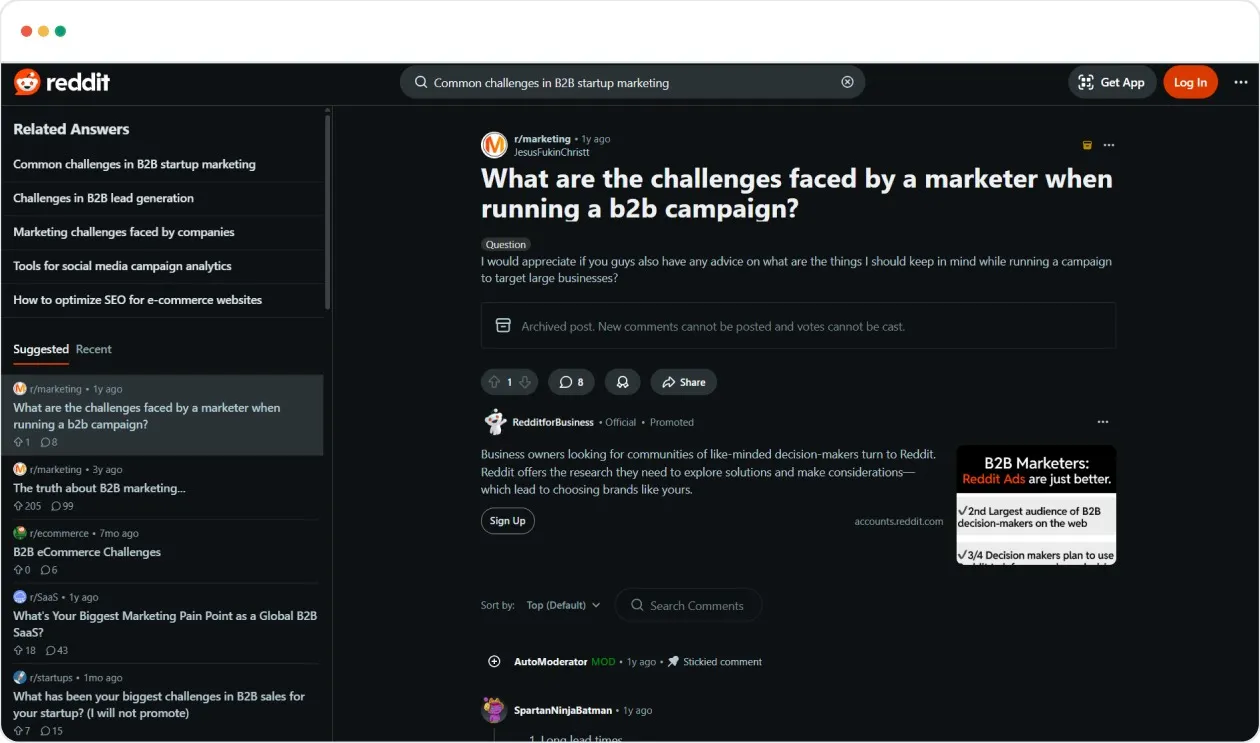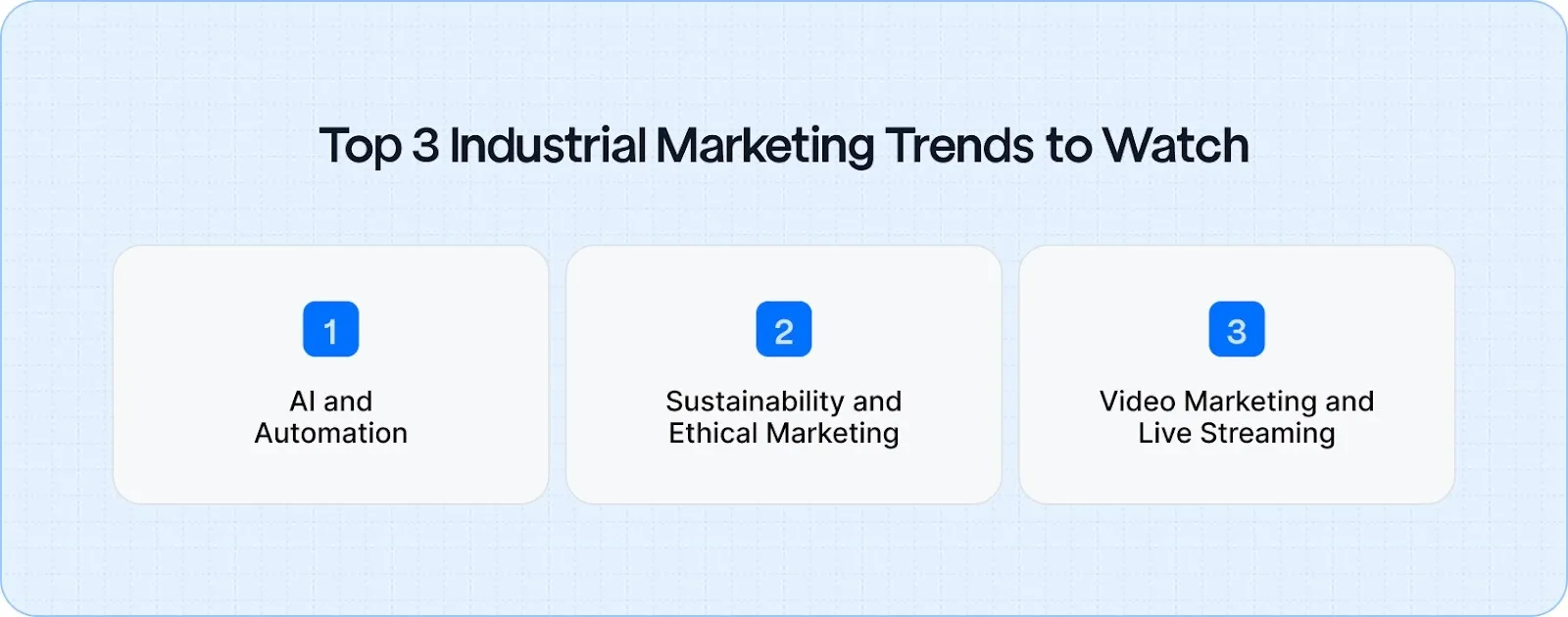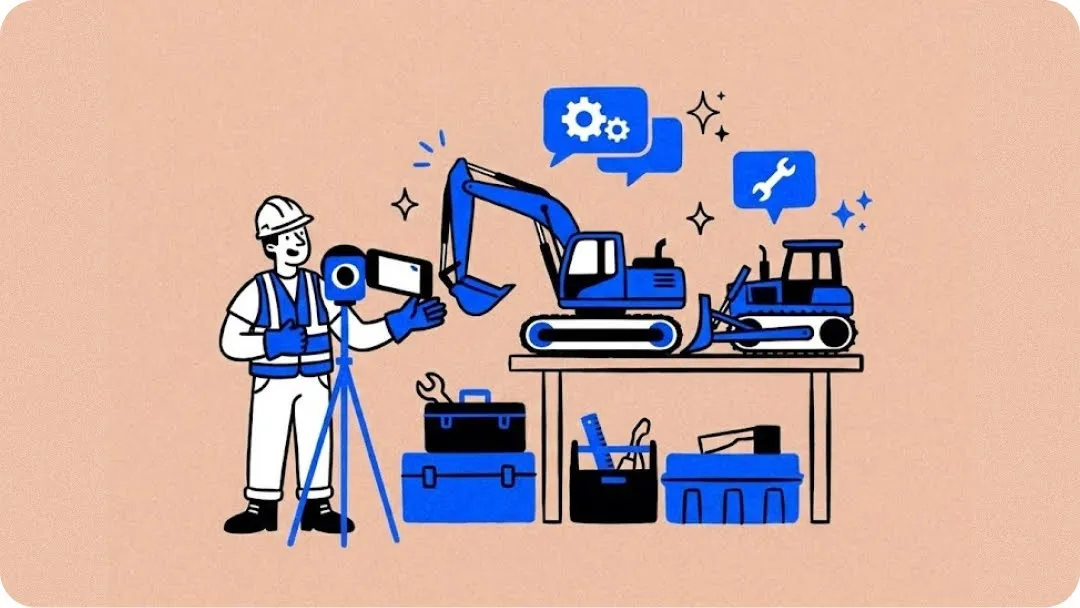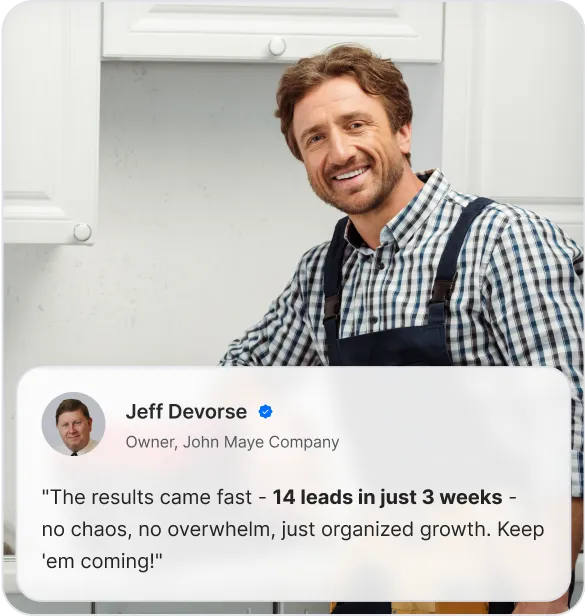Engaging with decision-makers who possess a deep understanding of the technical complexities of your products is essential.

You're offering custom machinery, specialized materials, or high-end industrial solutions, and the real issue is attracting the right leads.
Wasting marketing resources on prospects who don’t understand the precision or value of what you offer only leads to frustration. It’s about connecting with the engineers, procurement teams, and executives who can truly appreciate the intricacies of your product.
This guide dives into the exact strategies that will help you cut through the noise and reach the audience that matters most, ensuring your efforts drive meaningful results.
5 Key Industrial Marketing Strategies
These five strategies focus on maximizing your marketing impact by utilizing data, personalization, and optimization tools.
Each strategy is designed to cut through the noise, delivering valuable results for industrial businesses.
1. Account-Based Marketing (ABM): Target High-Value Accounts
ABM is a highly focused strategy where you direct your marketing efforts toward a select group of high-value accounts, ensuring every touchpoint is meaningful and personalized.
This strategy eliminates waste, maximizing return by targeting accounts that matter most to your business.
How to Implement:
- Identify Key Accounts: Use CRM tools and data insights to pinpoint companies that match your ideal customer profile.
- Craft Personalized Outreach: Develop tailored emails, landing pages, and content that resonate with the specific challenges and needs of these companies.
- Track Engagement: Use analytics to monitor how these accounts interact with your content, adjusting your outreach accordingly.
Must Read: Account Based Marketing for Manufacturers: Reach The Right Buyers
2. AI-Powered SEO and Content Creation
AI tools provide a more effective way to optimize your SEO strategy, automate content creation, and analyze search trends.
These technologies allow you to align your content with buyer intent and optimize it for long-tail and voice search queries, increasing your content’s reach and relevance.
Practical Application:
- Keyword Research: Use AI to identify long-tail keywords that align with the search behavior of your target audience.
- Content Creation: Leverage AI to draft content quickly and optimize it for SEO, ensuring it aligns with your audience’s search intent.
- Ongoing Optimization: Continuously monitor content performance and use AI-driven tools to update and improve rankings over time.

3. Content Marketing: Educate and Establish Authority
Educational content is vital in establishing your brand as an industry authority. By addressing your target audience’s pain points and challenges, you build trust and offer real solutions that lead to stronger, long-term customer relationships.
Types of Content:
- Whitepapers: Detailed resources offering solutions to industry challenges.
- Case Studies: Real-life examples showing how your products solved specific issues.
- Blog Posts & Webinars: Regularly updated content that educates your audience and drives engagement.
- Videos: Visual demonstrations of products and services that engage and inform your audience.
Also Read: 25+ Proven Strategies to Transform Your Industrial Content Marketing

4. Leverage Data Analytics: Drive Smarter Decisions
Using analytics enables you to track the effectiveness of your campaigns, understand buyer behavior, and make informed adjustments to your marketing efforts. This allows you to focus on strategies that drive real results and optimize your marketing ROI.
Tools:
- Google Analytics: Tracks traffic and user behavior to identify areas for improvement.
- SEMrush: Provides competitor insights and helps refine SEO strategies.
- HubSpot: Offers a comprehensive view of lead behavior and content performance.

5. Personalized Marketing with Dynamic Email Campaigns
Personalized email marketing is crucial for maintaining engagement and nurturing leads. By targeting buyer personas with tailored messaging, you can increase relevance and build stronger relationships, ultimately improving conversion rates.
Effective Techniques
- Segment Your Email List: Group contacts based on behaviors or demographics to send relevant content.
- Dynamic Content: Use dynamic email content, such as personalized product recommendations or content, based on recipient data.
Supporting Tactics to Boost Industrial Marketing Efforts
Alongside core strategies, supporting tactics such as optimizing your website for lead generation, leveraging social media for relationship building, and using paid search ads can amplify the effectiveness of your overall marketing campaigns.
Let’s explore these additional tactics.
1. Optimizing Your Industrial Website for Lead Generation
- Essential Elements: Your website should act as a lead-generation machine. It needs to be user-friendly, mobile-optimized, and fast-loading, with clear calls to action (CTAs) that guide visitors toward becoming leads.
- User Experience: A mobile-friendly website with easy navigation and a fast load time ensures your audience stays engaged. Make sure your website is optimized for SEO so it ranks well on search engines, attracting qualified visitors.
- Lead Generation Tools: Integrate lead capture forms, live chat, and gated content (e.g., whitepapers, eBooks) to convert anonymous visitors into Marketing Qualified Leads (MQLs) that can be nurtured further.
2. Social Media Marketing: Building Relationships & Engagement
- Platforms: Focus on platforms like LinkedIn and Twitter, which are ideal for engaging B2B audiences. Use these platforms to participate in industry conversations, share valuable insights, and build a network.
- Content Strategy: Post a mix of content, including thought leadership pieces, company updates, and industry insights. Engaging with followers regularly helps to establish trust and keeps your brand at the forefront of their minds.
- Paid Advertising: Run targeted ads on platforms like LinkedIn to reach decision-makers in your industry.
Must Read: The B2B Manufacturing Marketing System: Build Visibility, Trust, and Sales
3. Paid Search Advertising (PPC) for Immediate Results
- Targeting: Use Google Ads and LinkedIn PPC to reach prospects who are actively searching for solutions in your industry. By targeting specific keywords and phrases, you can attract relevant leads immediately.
- Remarketing: Retarget past website visitors with tailored ads to bring them back and encourage conversions. Customizing your ads based on their previous interactions helps boost effectiveness.
- Best Practice: A/B test your PPC ads and landing pages regularly to refine your approach and improve conversion rates. Experiment with different ad copies and CTAs to find the most effective combination.
Common Challenges in Industrial Marketing and How to Overcome Them
While industrial marketing has its unique challenges, addressing these issues head-on with the right strategies can significantly enhance your marketing effectiveness.
Let’s explore some common pain points and how to overcome them.
1. Long Sales Cycles in B2B
To overcome long sales cycles, invest in lead nurturing. Use automated email sequences, content downloads, and webinars to keep leads engaged over time, guiding them through the decision-making process.
A Reddit user recently pointed out a common issue for B2B marketers: “Long lead times, misalignment between sales and marketing, and CRM inefficiencies.” This reflects the struggles many face, miscommunication and delayed decision-making can hinder success.

Solution?
Gushwork streamlines your marketing efforts by automating lead tracking, content personalization, and analytics. It bridges the gap between sales and marketing, ensuring both teams align, shorten lead cycles, and boost conversions.
2. Complex Buyer Personas and Multiple Decision-Makers
ABM is your best option here. By targeting key decision-makers with highly personalized content, you can address the unique needs of each person involved in the buying process.

3. Integrating Traditional Methods with Digital Marketing
Use a hybrid marketing approach that combines traditional methods like trade shows and direct sales with modern tactics like SEO, PPC, and email marketing. This ensures that your strategy covers all touchpoints with your audience.

Top 3 Industrial Marketing Trends to Watch

Staying on top of the latest trends is essential to keep your industrial marketing strategy ahead of the curve. Here are the key trends shaping the industrial marketing landscape in 2025.
1. AI and Automation: Emerging Tech
AI and automation tools are transforming how industrial companies manage content creation, data analysis, and lead nurturing. These technologies streamline marketing processes, allowing for more efficient and personalized outreach.
Future Trends: AI-driven personalization will dominate, providing buyers with hyper-targeted content and recommendations based on their individual behaviors and preferences.
2. Sustainability and Ethical Marketing: Green Marketing
Industrial buyers are increasingly prioritizing sustainability. Brands that demonstrate eco-friendly practices contribute to a greener planet and build trust with their environmentally-conscious audience.
3. Video Marketing and Live Streaming
- Videos: Videos are one of the most engaging content types. Use them to showcase product demos, case studies, and behind-the-scenes looks at your company to better connect with your audience.
- Live Streaming: Live streaming events like Q&A sessions and product demos help engage prospects in real-time, creating interactive experiences that build stronger relationships with potential customers.
Crafting a Winning Industrial Marketing Strategy
To succeed in industrial marketing in 2025, a reactive approach won’t cut it anymore. It's essential to adopt a holistic strategy that incorporates Account-Based Marketing (ABM), AI-powered tools, and personalized content.
These tactics increase your efficiency and ensure you remain relevant in a highly competitive market.
Ready to elevate your industrial marketing strategy?
FAQs
Q1. What are the key strategies for industrial marketing in manufacturing?
A1. Effective strategies include Account-Based Marketing (ABM), AI-powered SEO, content marketing, data analytics, and personalized email campaigns to target the right decision-makers in the manufacturing sector.
Q2. How can I implement ABM in industrial marketing?
A2. ABM focuses on high-value accounts by using CRM tools to identify key prospects. Tailor outreach with personalized content, emails, and landing pages, while tracking engagement to refine strategies.
Q3. Why is AI important in industrial marketing?
A3. AI enhances SEO, automates content creation, and optimizes marketing strategies by aligning content with buyer intent. It also allows for continuous content updates and performance monitoring to stay competitive.
Q4. What role does content marketing play in industrial marketing?
A4. Content marketing builds authority by addressing audience pain points through educational content like whitepapers, case studies, and webinars. Repurposing long-form content for social media and emails increases reach.
Q5. How do I track the effectiveness of my industrial marketing campaigns?
A5. Use analytics tools like Google Analytics, SEMRush, and HubSpot to track buyer behavior, measure traffic, and adjust campaigns based on insights to optimize marketing ROI and engagement.
Q6. What is personalized marketing, and how can it improve industrial lead generation?
A6. Personalized marketing uses dynamic content in email campaigns to target specific buyer personas, improving relevance and increasing conversion rates by nurturing leads with tailored messaging.
Q7. What challenges should I expect in industrial marketing, and how can I overcome them?
A7. Common challenges include long sales cycles, complex buyer personas, and integrating traditional marketing with digital tactics. Overcome them with ABM, lead nurturing, and a hybrid strategy of digital and in-person methods.





















.webp)








.webp)
.svg)


.svg)
.svg)
.svg)




.svg)


